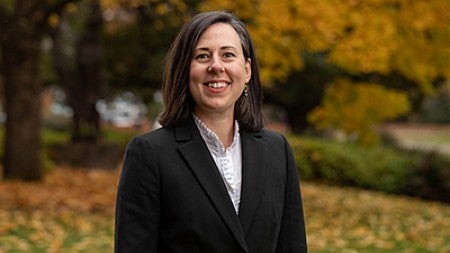
English
kclev@uoregon.edu | 541-346-1514
Courses: College Composition, 19th-c American Novel, Women Writers
In my classes you will:
- Learn with and from peers.
- Explore new perspectives.
I was invited into the Teaching Academy because:
- I was a Fellow in the Teaching Online CAIT Group.
- I participated in the UO Summer Teaching Institute.
In what ways are you working to make your teaching inclusive?
Listening to and acknowledging all student voices is the first step for me to more fully recognizing the diverse perspectives of our students in our campus community and building positive relationships. I see working in an organization that values diversity as an opportunity. It is an opportunity to expand the limits of what we and our students know and how we think. Every course that I develop and deliver uses universal design strategies to be inclusive and welcoming to diverse students. Universal design makes the classroom and learning accessible for all students. When I design syllabi, I include a diversity of authors, perspectives, and topics. When I design assignments and do activities in class, I consider a variety of learning styles. As I develop grading schemas and rubrics, I want process to be just as important as product, and, more recently, I have been strategizing ways to incorporate “failure‚” by creating more low-stakes assignments. Ultimately, I honor students’ hard work and, most importantly, I honor their voices, goals, and interests in the learning process.
What do you do in terms of professional engagement with the teaching and learning culture on campus or nationally?
To be an advocate for my students and for the power of reading and writing, I collaborate with my department, the university, and the larger disciplines of teaching writing and literature on best practices. I regularly attend TEP workshops and events, and participated in the summer institute for Difference, Inequality, and Agency. I have presented at national conferences on voice and multilingual writers and at regional conferences on assessment and inclusive practices in teaching and tutoring with fellow composition instructors and academic support specialists from the Jaqua Center and the Teaching and Learning Center. In 2017, I was awarded, along with one of my colleagues, a CAS Online Course Development Initiative grant to develop and pilot online WR 122 and 123. The journey into online teaching has been a new and exciting challenge. I’ve enhanced my teaching with new digital tools, which have also helped me give students more opportunities for engaging with texts and writing. Learning is part of teaching and I feel more engaged when I’m learning and growing. I hope that my enthusiasm and excitement is contagious and encourages my students’ curiosity and willingness to take risks.
In what ways was your teaching in this course research-led—informed by research on how students learn and inflected by UO's research mission?
To maintain the high standard our students expect from their UO education, align with the university’s current “Impact” initiatives, and stoke the fires of my own creative spirit, I am constantly innovating my teaching. Recently, I used design thinking principles to teach a collaborative and creative approach to the writing process and had students address a real issue on campus: how to engage undergraduates in the new Knight Science Campus. The course culminated with students constructing arguments for including undergraduate voices in the development of the new science campus. It created a unique writing classroom experience for students and asked them to address an issue right here on their campus. I learned a lot from trying out this new approach to teaching and to writing, and have shared my innovations with other interested instructors
Who or what made you want to be a teacher?
I was an English major as an undergraduate, and when people would inevitably ask me if I was going to be a teacher with my degree, I would decisively declare, “No way!” I was super quiet and timid, I barely raised my hand in class, and public speaking was a nightmare. I couldn’t imagine standing in front of a class for a living. And then I taught my first class as a graduate student at Temple University and immediately fell in love with teaching and working with undergraduates. Now I can’t imagine doing anything else.
The biggest role models for me have been female professors, advisors, and scholars I have met and worked with over the years. My favorite English professor, Dr. Jayne Drake, my dissertation advisor, Dr. Kate Henry, the director of the Honors Program at Temple, Dr. Ruth Ost, and the Dean of Graduate Studies in the College of Libreral Arts at Temple, Dr. Shawn Schurr. Academia needs more role models like Jayne, Kate, Ruth, and Shawn to show us how women can succeed with integrity, passion, and smarts. They helped me see past my nervousness, self-doubt, and self-condemnation. I hope to model for my students, especially other young women, what they have modeled so elegantly for me.
